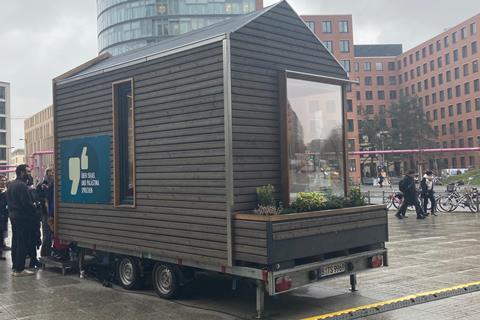
One of the ways in which the Berlinale is addressing the large, complex issue of the Israel-Hamas war in Gaza is by channelling it into a small, safe space called The Tiny House.
The Tiny House project is a cabin-like structure, set up near the festival’s hub in Potsdamer Platz for three days from February 17-19. Festival attendees and interested members of the public can come in and discuss their feelings around the issue, with the support of two moderators, Shai Hoffmann and Ahmad Dakhnous.
Hoffman, a German Jew with Israeli roots, is the architect of the project. With his German-Palestinian colleague Jouanna Hassoun, he was already working with children in schools to help create spaces for young people to discuss the Middle East conflict. He set up a podcast, run out of the Tiny House cabin, to offer the wider Berlin society the chance to join him on discussing the war.
In January, the Berlinale approached him to bring the Tiny House to this year’s festival.
“It’s very hard from a German perspective to talk about Israel and Palestine. To have such a space, where people can come and talk intimately in a braver space about this war and their feelings, and insecurities, is very important,” said Hoffmann.
Hoffmann was introduced by a friend to Dakhnous, the Palestinian co-founder of youth project Connect! Syrian Diaspora, who came on board the project shortly before the festival began.
“We’re working closely with the festival, we’re part of the programme. Jouanna and I worked with the Berlinale on their positioning on the war,” noted Hoffmann.
The cabin fits six people, but the interest in the project has meant greater numbers have piled into the room, with a near-constant stream of individuals flowing in, both part of and unaffiliated to the festival, including some children.
“It’s been pretty packed,” said Dakhnous. “Inside, we didn’t have any cases that were problematic. Of course it was emotional, but this is why this place is here, to be emotional. People talked about problems they have regarding the topic in their personal relationships, with their family, with their partners.”
“The Berlinale as an institution or platform is not a political institution, but it is a platform for films that can be very political, as you saw with No Other Land, for instance,” observed Hoffmann, referencing the Panorama documentary from a Palestinian-Israeli collective, exploring how a West Bank community is resisting the Israeli army. “This is something that’s very important within a democracy. Art should be freedom of speech. But we also need to talk about where does freedom of speech end?
“[The Berlinale] formulated a clear positioning towards humanity. This is a very strong position, in times of crisis. Not just the war in Israel and Gaza, but also in Ukraine, and now [Russian opposition leader] Navalny died. As a film festival, you find a neutral spot to allow filmmakers to talk politically. If someone is justifying violence for instance, or is trying to cancel an event where people are trying to have a dialogue about a topic, for me, it’s not a legitimate form of advocating for anything.”
Although February 19 is the final day for the Tiny House project, Hoffmann and Dakhnous are open to continuing the project at future film festivals and wider artistic events. “We’re open to everything, every project that is fostering dialogue between two people,” said Hoffmann.
“We have a responsibility, as citizens for Germany, to look what the political debate on Israel and Palestine is doing for us as minorities in society,” he added. “Politicians, and some media outlets, are trying to divide Muslims and Jews. This is something we need to prevent.”
Rallies, questions, letters and memorials
The conflict in the Middle East has been front and centre at this year’s Berlinale, with a group called Palestine Direct Action calling for a ceasefire at the Gropius Bau yesterday (February 18), the European Film Market HQ, unfurling banners, dropping leaflets and protesting outside the venue. Dozens of people inside the Gropius-Bau left their meetings to observe the protest, with many joining in with the chants and applauding, before the protests were cleared.
During the jury press conference, several questions on the situation in the Middle East were fielded at the jury, which is led by Lupita Nyong’o. “I’m in favour of peace, in favour of discussing, talking, which I’m sure that we’ll do in this jury,” said German filmmaker Christian Petzold, one of several hundred filmmakers to sign an open letter in December calling for a ceasefire in Gaza. Nyong’o has also signed a similar letter.
Mariette Rissenbeek, in her final edition as co-festival head, read a statement about the Berlinale’s political responsibilities and stance at opening night, noting, “We call on everyone to do everything possible to protect the lives of civilians,” while German federal government commissioner for culture and media, Claudia Roth, shouted “Bring them home, now!” in her opening night speech, in reference to the Israeli hostages held captive in Gaza.
Over towards the Berlinale Palast, a handful of activists from Filmworkers For Palestine gathered across a few consecutive days of the festival at 12.30 for 30 minutes, to recite the names of 60 artists who have been killed in Gaza. This action is not affiliated with the festival.






![The Brightest SunScreen[Courtesy HKIFF]](https://d1nslcd7m2225b.cloudfront.net/Pictures/274x183/3/5/0/1448350_thebrightestsunscreencourtesyhkiff_312678.jpg)


















No comments yet